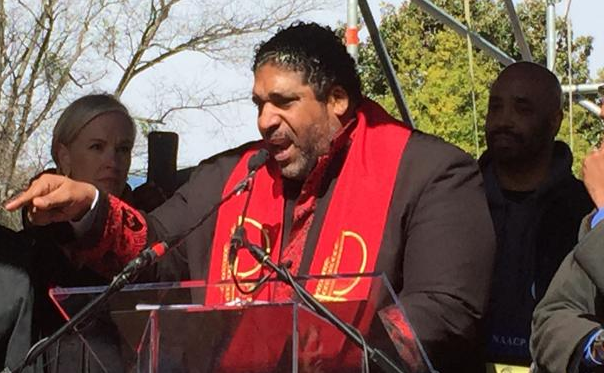
Planned Parenthood Federation of America president Cecile Richards (at left) and NAACP national president Cornell Brooks (far right) listen to the North Carolina NAACP’s Rev. William Barber speak at the Moral Mondays march in downtown Raleigh, North Carolina on Saturday, February 14, 2015. DAVID SWERDLICK/THE ROOT
Raleigh, N.C.: An African-American Muslim imam, Oliver Muhammad, offered the call to prayer; members of black Greek-letter fraternities served as event marshals and as marchers in North Carolina’s Moral Monday movement began their walk across downtown Raleigh, the state’s capitol, Chapel Hill Town Council Member Maria Teresa Palmer announced—in Spanish—that “interpreters will be available at the intersection of Hargett and Fayetteville.”
It’s that kind of come one, come all event. And even though this year’s ninth annual march wasn’t as big as last year’s—one that The Nation’s Ari Berman reported as “the largest civil rights rally in the South since the Selma to Montgomery march in 1965”—organizers again brought together a diverse coalition of activists on a chilly Valentine’s Day to protest what movement leader and state NAACP president Rev. Dr. William Barber II described as the state’s—and the nation’s—“heart problem.”
And while Moral Mondays movement is left-leaning, Barber told supporters that he wanted them to be political “defibrillators” because “we find we’ve got, not a left problem, or a right problem, or a conservative problem or a liberal problem. We’ve got a heart problem. When money and greed and political hubris and pride and ego and beating your opponent become more important than working together to uplift humanity we’ve got a heart problem.”
For the movement, the stakes haven’t changed.
Rev. Barber called on legislators to “fund Medicaid expansion, raise the minimum wage, index it with inflation—put it on the ballot and let the people vote,” as well as “restore cuts to public education,” reject “the attacks on women’s health and environmental protection, repeal the death penalty, reform the criminal justice system,” enact “fair immigration reform and respect the constitutional rights of all humanity, regardless of race, creed, color and sexuality.”
At a press briefing, he emphasized that his organization would wait to see if state lawmakers take action on this slate of issues in the early part of 2015—and, along with the Advancement Project—continue to pursue litigation to challenge the rollback of early voting and same-day voter registration. If there’s no action, Barber vowed, peaceful protests would continue throughout North Carolina during the summer, as they have for the last two years.
Sixteen-year-old Jasrae Brooks from Charlotte, said her group Raise Up For 15 was at the march because “We can’t survive on $7.25 an hour working at these fast-food restaurants, you know, we’ve got bills to pay,” adding that “We just need to raise up to $15 so it can be a little bit better out here.”
As the Associated Press reports, though, state “lawmakers have refused to expand Medicaid to cover more of the working poor, a series of election law changes remain on the books and the minimum wage remains at $7.25 per hour.” And last year’s movement activism didn’t dislodge Republican control of the General Assembly or stop former N.C. House Speaker Thom Tillis from winning election to the U.S. Senate.
But the march was a timely balm for a community reeling from last week’s shootingof three young Muslim Americans in Chapel Hill, N.C., with Farris Barakat, the brother of one of slain student Deah Barakat, speaking side-by-side with Pierre Lacy, the brother of slain Bladenboro, N.C. teenager Lennon Lacy, and telling the crowd at the start of the march, “we have to work to bring peace and justice to this Earth.”
That sentiment was echoed by Lynn Heritage of Wilmington, N.C.’s Grandmothers for Peace, who said “We came because wanted to be a presence” and to stand with those “talking about justice for all and equality for all, particularly with what happened just a few days ago in Chapel Hill.”
Among others joining Barber were NAACP President Cornell Brooks, American Federation of Teachers President Randi Weingarten and Planned Parenthood Federation of America President Cecile Richards, who told The Root she was there “Because this movement for moral authority in North Carolina is a fight for all of us.”
And in contrast to other movements around the country, that have seen tensions develop between younger #BlackLivesMatter protestors and the old-guard civil rights establishment, old and young blended together for the Moral Mondays event, with Barber and other senior leaders marching in line behind younger activists and the platform program starting with a video that featured students speaking out on their issues.

















